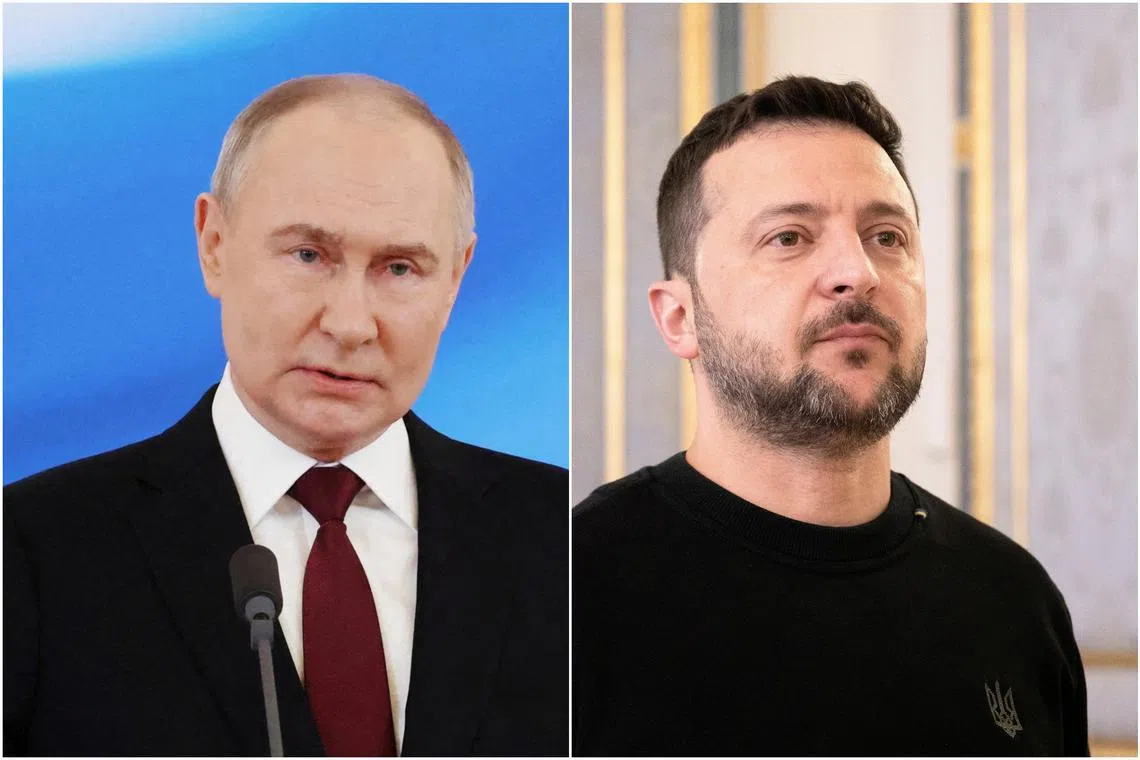Ukraine’s Zelensky lacks legitimacy as his term expired, says Putin
Sign up now: Get ST's newsletters delivered to your inbox

Russian President Vladimir Putin (left) said Mr Volodymyr Zelensky's status was problematic.
PHOTOS: REUTERS
MOSCOW – Russian President Vladimir Putin said on May 24 that Ukrainian President Volodymyr Zelensky had no legitimacy following the expiry of his five-year term, and this would raise a legal obstacle if Moscow and Kyiv were to hold peace talks.
With Ukraine under martial law in the third year of Russia’s full-scale invasion, Mr Zelensky has not faced elections despite the expiry of his five-year term this week – something he and Ukraine’s allies deem the right decision in wartime.
Mr Putin is ready to halt the war in Ukraine with a negotiated ceasefire that recognises the current battlefield lines, Reuters reported on May 24, citing four Russian sources, but is ready to fight on if Kyiv and the West do not respond.
At a televised press conference during a visit to Belarus, Mr Putin said Mr Zelensky’s status was problematic.
“But who to negotiate with? That’s not an idle question... Of course, we realise the legitimacy of the incumbent head of state is over,” he said.
Ukrainian officials dismiss any notion of Mr Zelensky lacking legitimacy in a time of war.
Ukraine’s Speaker of Parliament Ruslan Stefanchuk said earlier this week that anyone questioning the President’s legitimacy was an “enemy of Ukraine” spreading false information.
Mr Putin said the West would use a Swiss-hosted conference on the war, due to take place in June, to endorse Mr Zelensky’s legitimacy, but these would be “PR steps” with no legal meaning.
He said peace should be worked out through common sense, not ultimatums. It should be based on draft documents worked out between the two sides in the early weeks of the war, and on “today’s realities on the ground” – a reference to the fact that Russia controls nearly 20 per cent of Ukraine.
“If it gets to that point, we will need of course to understand who we should and can deal with, to arrive at signing legally binding documents. And then we must be fully sure we are dealing with legitimate (Ukrainian) authorities,” Mr Putin said.
Mr Putin won a new six-year term in March in a closely managed election that Russia’s opposition called a sham.
Two anti-war candidates were barred from running on technical grounds, and all Russia’s leading opposition figures are in jail or abroad. The best known, Alexei Navalny, died in February in an Arctic penal colony.
Mr Putin’s comments are likely to be taken by Ukraine and its Western allies as further evidence that he has no real intention of entering peace talks, despite frequently stating his willingness to negotiate.
Peace summit
Mr Zelensky, in his nightly video address, made no reference to the Russian President’s remarks, but said Mr Putin was determined to scuttle June’s peace summit.
“He is afraid of what the summit may produce. The world is capable of forcing Russia into peace and compliance with international security norms,” Mr Zelensky said.
“Russia has nothing to counter the world majority. The peace summit is a formula that will allow Putin to lie no longer.”
Russia is not invited to the summit in Switzerland and has dismissed the event as meaningless without its participation.
Mr Zelensky has repeatedly said peace on Mr Putin’s terms is a non-starter. He has vowed to retake lost territory, including Crimea which Russia annexed in 2014. He signed a decree in 2022 that formally declared any talks with Mr Putin “impossible”.
Mr Kyrylo Budanov, the head of the Ukrainian Defence Ministry’s Main Intelligence Directorate, warned in February that Russia would pursue a campaign aimed at undermining the legitimacy of both Mr Zelensky and Ukraine’s political system. REUTERS


